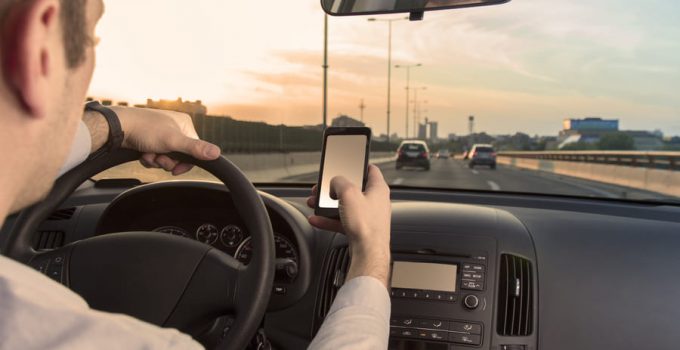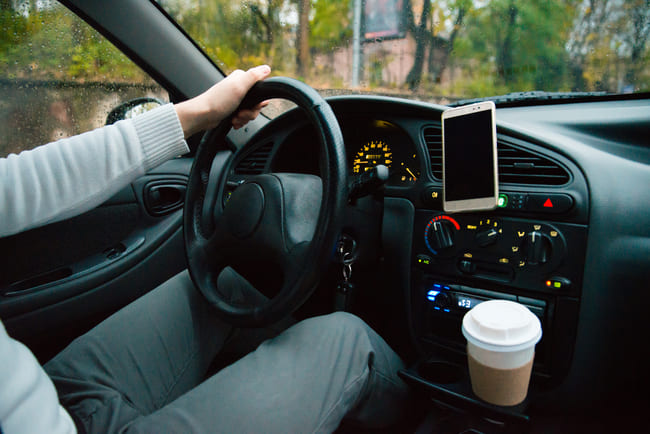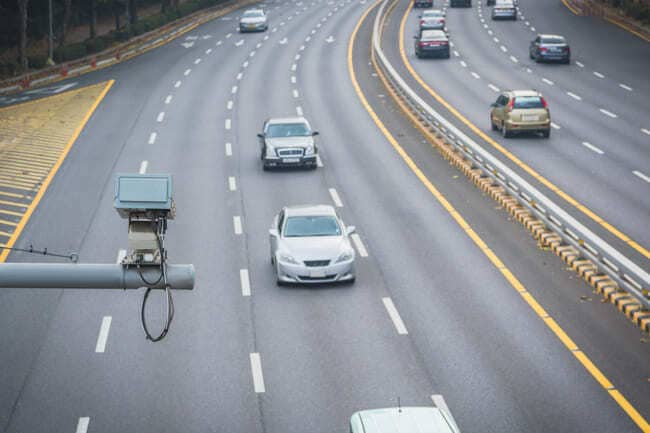
The smartphone allows us to be reachable and online anytime, anywhere. But you should be particularly careful when driving a car, as there are sometimes high fines and points if the police see you with a mobile phone at the wheel or flash your speed camera. It also increases the risk of an accident, putting you and other road users at risk. Since the introduction of a new smart speed camera that can automatically detect when you're driving with your cellphone behind the wheel, it's also become a lot easier for the police to prove the offense. However, the legal situation is not very clear here, as in some cases it is permitted to use electronic devices in the car. In this article, you'll learn what's allowed and what's not, what penalties and fines you can face if you don't follow the rules, how you can appeal, and how the new speed camera works.
Contents
Mobile phone at the wheel: What is permitted and what is not?
Being distracted by your cell phone while driving is one of the most common causes of serious car accidents, along with driving under the influence of alcohol, tailgating and speeding. However, exact figures are unfortunately not available, since recording “distraction” as the cause of an accident is made more difficult by the fact that the police are often unable to prove this and hardly any person who caused the accident voluntarily states that he or she was distracted by looking at the cell phone was. Many drivers are of the opinion that it is not a problem just to quickly pick up the mobile phone to read a short message or to dismiss an unwanted call. But just three seconds of distraction by looking away from the road means that you cover more than 42 m at a speed of 50 km/h without even realizing it. At a speed of 120 km/h it is even 100 m. It is therefore only logical that in this case you will no longer be able to react in time to unexpected obstacles or dangerous situations, such as a red light, a vehicle turning off or a pedestrian who wants to cross the street.
For this reason, a corresponding provision has been included in the Road Traffic Act (StVO), which states that the use of an electronic device that is used for communication, organization or information is only permitted if this device is neither picked up nor held in the hand and only the voice control or read-aloud function is used or you only look away from the road and towards the device for a very short time, maximum one second, provided, however, that the visibility, road, weather and traffic conditions allow this allow (§ 23 Abs. 1a). Accordingly, reading or writing messages, pushing callers away, holding or operating electronic devices while driving is prohibited. “Electronic device” refers not only to mobile phones but also to tablets, laptops, e-book readers, DVD players, touch screens and virtual reality glasses.
Not everything is strictly forbidden, there are also a few exceptions:

- Telephoning while driving is permitted as long as a hands-free device or a headset is used.
- The smartphone may be used as a navigation device, provided it is securely fastened in a suitable mobile phone holder and the address can only be entered when stationary with the engine completely switched off.
- The mobile phone may be picked up or moved to a different location, provided no button is pressed.
- If your vehicle is equipped with an electronic parking aid, such as a reversing camera, you can look at the screen longer as long as you park at walking speed.
- When the engine is completely switched off, electronic devices can be used without restrictions, but this does not apply if they are switched off by the start-stop Automatic at traffic lights or when stopping in the hard shoulder of a motorway.
Incidentally, this rule applies not only to car drivers, but also to cyclists and driving instructors during a driving lesson or driving test.
Mobile phone at the wheel: penalty and fine
If you violate the mobile phone ban while driving, you will be fined between 100 and 200 euros, a point in Flensburg and possibly other sanctions that depend on the severity of the offence. Since the offense of “mobile phone at the wheel” is an administrative offence, the point awarded for it expires after 2.5 years.
The amount of the penalty depends on the following circumstances:
- Flashed by police while using cellphone or other electronic device caught or reported by eyewitnesses: fine of 100 euros and a point in Flensburg.
- Mobile phone at the wheel endangering other road users, for example if you use the If you drive in a zigzag line with your smartphone or have to correct your lane: fine of 150 euros, two points in Flensburg and a one-month driving ban.
- Mobile phone at the wheel in an accident: If property is damaged as a result of disregarding the mobile phone ban, the fine will be increased to 200 euros and you will receive two points and a one-month driving ban. In the case of personal injury, you can even face further fines or imprisonment for negligent bodily harm or negligent homicide.
- Mobile phone at the wheel during the probationary period: As a serious offense, this constitutes an A-violation and is punished with a fine of 100 euros, one point and an extension of the probationary period to four years. In addition, as a novice driver, you must attend a fee-based advanced seminar. If you are repeatedly caught using your mobile phone at the wheel during the probationary period, you will have to pay a fine of 100 euros again, you will receive another point and possibly also a driving ban due to “perseverance”. A third violation of this regulation or another third A violation may result in your driver's license being revoked for 6 months or more, which you must reapply for after the suspension period.
- By the way, cyclists also have to expect a fine of 55 euros for this offence.
Mobile phone at the wheel: objection
Since the burden of proof also applies to the offense of “mobile phone driving”, in many cases it is worth filing an appeal against a corresponding fine notice or at least considering it. This is particularly useful for professional drivers and novice drivers, as they could lose their jobs as a result of the driving ban and face serious consequences during the probationary period. It is often difficult for the police to enforce a fine due to cell phone driving without a photo as evidence, because it has to be proven that the cell phone was held in the hand with the engine running and that no voice control or read-aloud function was used or that the smartphone was looked at for a long time. For this reason and because of formal errors, appeals are very often successful here. Please note, however, that you must submit this within 14 days of receiving the notice.
Speed camera recognizes a cell phone at the wheel

A pilot project is currently taking place in the Netherlands using speed cameras with artificial intelligence that trigger automatically as soon as they detect that a driver is holding a mobile phone, tablet or navigation system while driving. Afterwards, however, the image material still has to be viewed by people in the conventional way to check whether it is actually an electronic device and therefore a traffic offence. Although these smart speed cameras are only triggered in a specific case of suspicion, this requires comprehensive monitoring of all drivers, which is why they are only used in the Netherlands for the time being and it is questionable whether they will also be used in The United Kingdom in the future.
Conclusion
Using an electronic device while driving can quickly become dangerous for you and others. We recommend that you do not pick up your cell phone while driving, put it out of reach if possible and switch it to silent mode so as not to be tempted in the first place or to stop to make a call and switch off the engine or a hands-free system and voice control to avoid fines, points and a driving ban for cell phone driving. However, if you are unjustly accused of using your cell phone while driving, it is often worth appealing the corresponding fine notice.
